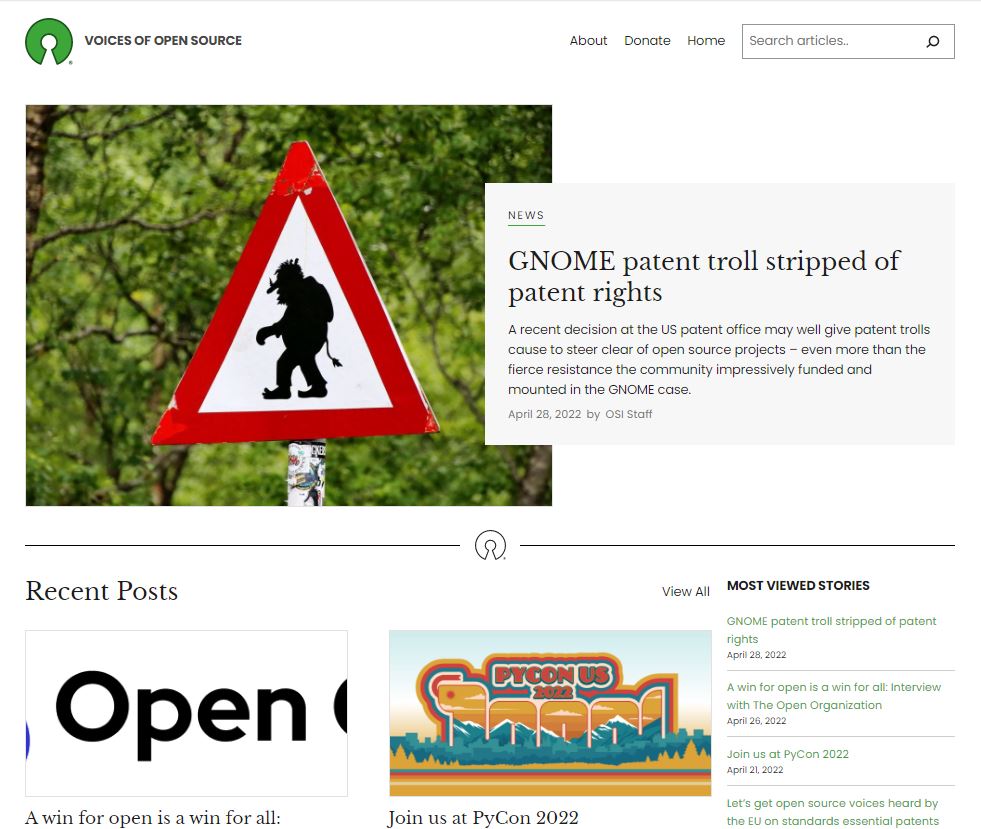The Open Source Initiative (OSI), a public benefit corporation and steward of the Open Source Definition, has launched a news blog on WordPress. In 2021, OSI’s board appointed Stefano Maffulli as its first Executive Director, and he is leading the organization in overhauling its web presence.
“One of the main objectives for OSI in 2022 is to reinforce our communication channels,” Maffulli said. “We’re improving the perception of OSI as a reliable, trustworthy organization. The OSI didn’t have a regular publishing schedule before, nor a content plan. Now we have established a regular cadence, publishing at least once a week (often more), commenting on recent news like a winning against a patent troll or court decisions about open source licenses, featuring our sponsors, and offering opinions on topics of interest for the wider community. It’s a starting point to affirm OSI as a convener of conversations among various souls of the open source communities.”
The blog was launched on a subdomain of the opensource.org website, which uses Drupal 7, self-hosted on a droplet from Digital Ocean. It’s also tightly integrated with CiviCRM to manage members’ subscriptions, donations from individuals, tracking sponsorships, and sending the newsletter.
As Drupal 7 is approaching EOL in November 2022, the team is planning to move everything to WordPress. They explored managed hosting with Drupal but found it was more expensive and also required them to migrate to a more recent version of Drupal. Themes and plugins made for D7 are not compatible with D9+, so they didn’t see an advantage in terms of time or simplicity.
“Unfortunately we don’t have staff to manage a self-hosted Drupal installation and nobody on staff really knows how to use it,” Maffulli said. “Tasks like creating landing pages proved to be quite time consuming for us.
“With money, knowledge and time constraints and an urgent need to increase our publishing rate, ramping up the organization’s visibility online we decided to migrate the website in two phases: First, we migrate the blog so we have a fresh look together with the improved publishing schedule. This phase is complete – the blog is on a managed hosting offered by DreamHost. The second phase is the migration of the rest of the site: this is ongoing with the help of Automattic and will take a few months to complete.”
Although Maffulli wanted to avoid creating a blog under a subdomain, and preferred using the old URL (opensource.org/blog...), mixing Drupal self-hosted with a managed WordPress site was not a common use case with straightforward solutions. If the new blog design looks familiar, that’s because it was inspired by WP Tavern’s new design.

“Once we decided to go with a subdomain, the new site took really only a few days to launch: I knew I wanted to have a simple site, minimal amount of plugins, no page builders and a very clean design based on WP Tavern, of which I’m a fan,” he said.
Since the Tavern’s theme wasn’t yet on GitHub, Maffulli contracted a developer who used WordPress’ new full-site editing features to create a simple child theme based on the Twenty Twenty-Two default theme. He said he is glad overseeing the project gave him a chance to learn the basics of FSE.
Some members of the OSI staff were already familiar with WordPress, which contributed to the decision to use the software. The wide range of functionality and third-party integrations were also a factor.
“We rely a lot on content calendar solutions that allow to manage schedule posts and social media promotions from one tool,” Maffulli said.
“We’re addicted to CoSchedule. That tool is far from perfect, primarily because it’s not Open Source. But it’s so incredibly powerful and convenient for a small team like us. We track our publishing calendar and tasks with CoSchedule, making it so easy not to miss a beat: every blog post has it’s social media attachment, same with the newsletter, that becomes a blog post for archive. Soon, we’ll add podcasts.”
Maffulli said he wishes the WordPress media library offered a more standardized way of storing and tracking copyright information, like the author, source, and license.
“I think this unnecessarily exposes WP users to copyright infringement claims where trolls could threaten successfully people who may have not kept their records clean,” he said. “It’s something to think about for future releases of Instant Images and similar plugins.”
The OSI team has opted to keep comments closed on posts at this time, since they do not have the capicity to properly moderate comments.
“I have a lot of experience managing online communities and I know it can become very time consuming,” Maffulli said. “We just don’t have staff but we’re raising funds to solve that.”
OSI is also looking into creating a way to give its members the privilege of commenting. This would require a way to integrate authentication with CiviCRM to access members’ records.
“While we build staff and upgrade opensource.org, I hope to setup services from the IndieWeb community into Voices of Open Source,” Maffulli said. “This will allow for comments made on various social networks to be aggregated back into blog.opensource.org.”
The new Voices of Open Source blog has started by featuring the network of OSI affiliates, which boasts 80 organizations, including Mozilla, Wikimedia, Linux Foundation, OpenUK, and more.
“We’d like to share OSI’s unique position to highlight open source stories, challenges, and successes of companies and people around the world,” Maffulli said. OSI is in communication with its affiliates to make them aware of this opportunity and is aiming to open guest posting on the blog to indvidual members in the wider community sometime in the future.
